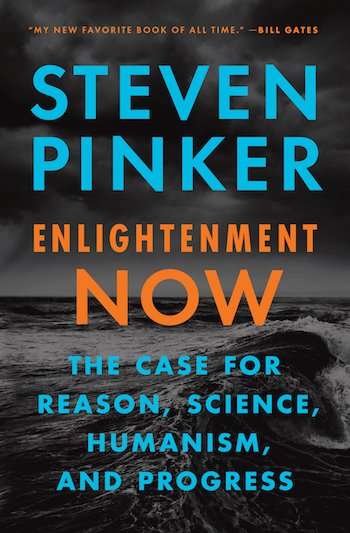Defending the Enlightenment
Steven Pinker takes on the tribalists.

Enlightenment Now: The Case for Reason, Science, Humanism, and Progress, by Steven Pinker, Viking, 556 pages, $35

For Immanuel Kant, the central theme of the Enlightenment—that great 18th century movement that emphasized the power of reason—was Sapere aude. This is usually translated as "Dare to know" or, more loosely, "Have the courage to use your own understanding." Enlightenment thinking engendered liberal democracies, civil liberties, free markets, religious toleration, and free speech; it helped us move out of the abject poverty, pervasive violence, and appalling ignorance that marked most of human history.
In Enlightenment Now, the Harvard cognitive scientist Steven Pinker defends those ideals, arguing that "we can apply reason and sympathy to enhance human flourishing." He also worries that many of us take for granted the Enlightenment ideals and institutions that have made our relatively peaceful and prosperous world possible. Political leaders and their intellectual fellow travelers, he warns, seek power and position by appealing to some of the less admirable "strands of human nature: our loyalty to tribe, deference to authority, magical thinking, the blaming of evildoers."
In an earlier book, The Better Angels of Our Natures, Pinker showed that violence has been declining for centuries. That is clearly evidence of considerable moral progress. Pinker broadens his focus in Enlightenment Now to document the many other aspects of human flourishing that progress has made possible.
For example, no country had an average life expectancy above 40 years in 1800; now the global average is above 71. In 1947, 50 percent of the world's population was undernourished; now the number is 13 percent. "The gross world product today has grown almost a hundredfold since the Industrial Revolution was in place in 1820, and almost two hundredfold from the start of the Enlightenment in the 18th century," Pinker points out. In 200 years, the rate of extreme poverty (living on less than $1.90 per day) has declined by 90 percent, with half of that decline occurring in the past 35 years. As the economist Angus Deaton once wrote, "Ever since people rebelled against authority in the Enlightenment, and set about using the force of reason to make their lives better, they have found a way to do so, and there is little doubt that they will continue to win victories against the forces of death."
Pinker notes that rising incomes correlate with the growing respect for "emancipative values" such as women's equality, free speech, gay rights, and participatory democracy. In the past 25 years, the percentage of Americans who support equal rights for women and for racial and sexual minorities has grown to a majority. Similar trends are occurring throughout the world. In 1950, almost half of the world's countries had laws that discriminated against ethnic and racial minorities. By 2003, less than a fifth did. By 2016, consensual homosexuality had been decriminalized in 121 United Nations member states. It was still illegal in 73 countries, but that was down from 92 countries just a decade earlier.
Pinker also demolishes intellectually fashionable eco-pessimism. Environmental problems, like other problems, are being solved by the human ingenuity unleashed by such Enlightenment institutions as science and markets. "As the world gets richer and more tech-savvy, it dematerializes, decarbonizes, and densifies, sparing land and species," Pinker writes. "As societies have become healthier, wealthier, freer, happier, and better educated, they have emitted fewer pollutants, cleared fewer forests, spilled less oil, set aside more preserves, extinguished fewer species, saved the ozone layer, and peaked their consumption of oil, farmland, timber, paper, cars, coal, and perhaps even carbon." As poor countries get richer, expanding forests and falling levels of pollution will ensue in those nations too.
And in the last two centuries, literacy has risen from less than 12 percent of the world's population to over 83 percent today. The global literacy rate for young adults—ages 15 to 24—stands at 91 percent.
Pinker also shows that the cultural critics who solemnly declaim that "money can't buy happiness" are largely wrong. Citing data from the World Happiness Report 2016, he writes: "Not only are richer people in a given country happier, but people in richer countries are happier, and as countries get richer over time, their people get happier."
Some pessimists may concede that human condition has improved massively over the last 200 years but nevertheless insist that the total catastrophe is just over the horizon. A nuclear war could break out. Prominent techies, like Tesla and SpaceX founder Elon Musk, warn that super-intelligent robots could eliminate humanity. In 2002, astronomer Martin Rees bet that by 2020, a "bioterror or bioerror will lead to one million casualties in a single event."
While acknowledging that nuclear war is still possible, Pinker points out that mutual deterrence has been working: There have been no world wars between great powers since the development of nuclear weapons. Even more happily, the world's nuclear weapon stockpiles have declined by 85 percent since their peak in 1967. To further reduce the chances of a disastrous nuclear exchange, he advises countries to declare a "no first use" policy and to take their intercontinental missiles off their hair-trigger launch-on-warning alert status.
With regard to supposed existential threats posed by advancements in infotech and biotech, Pinker counters by citing What Technology Wants author Kevin Kelly's insight: "The more sophisticated and powerful a technology, the more people are needed to weaponize it. And the more people needed to weaponize it, the more societal controls work to defuse, or soften, or prevent harm from happening." In other words, the highly connected and cooperative world that Enlightenment institutions have conjured into existence tends to generate social antibodies that protect against risks of rogue menaces destroying civilization.
So is Pinker a 21st century version of Dr. Pangloss, the diehard optimist in Voltaire's Enlightenment novel Candide who claimed that "all is for the best in this best of all possible worlds"? Not at all. There are threats to progress, reason, science, and humanism. Progress is an uneven process, and setbacks do occur.
Pinker is worried about the spread of authoritarian nationalism in many Western countries. The new would-be autocrats appeal to tribalist instincts and encourage zero-sum thinking: the idea that the gains of others must come at our expense.
Pinker also worries that opinions about many issues—climate change, gun control, minimum wage laws, abortion—now serve predominantly as signals to members of your political tribe that you are loyal. Changing your views on some salient issues would make you a traitor to your tribe. "We must not let the existence of cognitive and emotional biases or the spasms of irrationality in the political arena discourage us from the Enlightenment ideal of relentlessly pursuing reason and truth," Pinker writes. He suggests various preliminary efforts to enhance rationality in politics, such as convening small discussion groups of political adversaries with the aim of arriving at a consensus on an issue. But he admits that it will take time to develop new institutions that can more effectively ameliorate toxic polarization.
He points out that "the traditional causes of belief—faith, revelation, dogma, authority, charisma, conventional wisdom, hermeneutic parsing of texts, the glow of subjective certainty—are generators of error." Science, on the other hand, embodies the "ideal that we must allow the world to tell us whether our ideas about it are correct." This Enlightenment insistence on empiricism does not please everybody. Pinker observes that some philosophers, sociologists, and historians teach that science "is just a pretext for oppression." But history, he writes, shows that this idea is absurd: "Genocide and autocracy were ubiquitous in premodern times, and they decreased, not increased, as science and liberal Enlightenment values became increasingly influential."
Pinker defines humanism as "the goal of maximizing human flourishing—life, health, happiness, freedom, knowledge, love, richness of experience." Humanism stands in contrast with the parochial dogmas of various theistic moralities and the seductive idea of romantic heroism. Against theistic moralities, Pinker cites Socrates' argument that "if the gods have good reasons to deem certain acts moral, we can appeal to those reasons directly, skipping the middlemen. If they don't, we should not take their dictates seriously." Romantic heroism, meanwhile, embodies the idea that morality consists of purity, authenticity, and the greatness of an individual or nation. It's a way of thinking that sacrifices the interests of individual people to the supposed greater glory of the tribe, the race, or the class. Instead of productive cooperation, they engender destructive conflict.
As the true heirs of the Enlightenment, contemporary classical liberals will find much that Pinker has to say quite congenial. Enlightenment Now strikes a powerful blow against the contemporary mystifications being peddled by tribalists on both the left and the right. "The appeal of regressive ideas is perennial, and the case for reason, science, humanism, and progress always has to be made," Pinker concludes. That is exactly what he has achieved in this intellectually exhilarating book.


Show Comments (114)